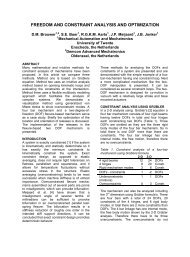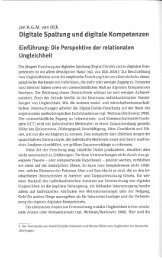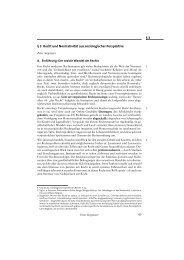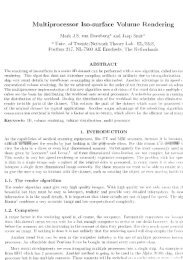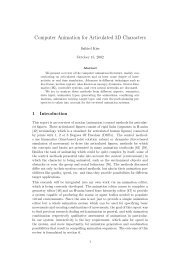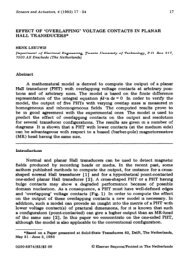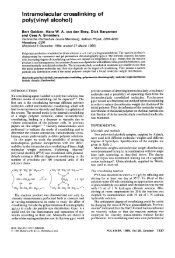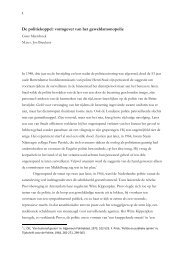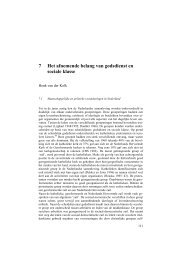Innovation and institutional change: the transition to a sustainable ...
Innovation and institutional change: the transition to a sustainable ...
Innovation and institutional change: the transition to a sustainable ...
You also want an ePaper? Increase the reach of your titles
YUMPU automatically turns print PDFs into web optimized ePapers that Google loves.
132 Chapter 5<br />
<strong>and</strong> search routines in <strong>the</strong> knowledge infrastructure that were strongly<br />
intertwined with <strong>the</strong> technological <strong>and</strong> organisational nature of <strong>the</strong> electricity<br />
system. In <strong>the</strong> economic system <strong>the</strong> mode of provision for electricity was<br />
mostly taken for granted, with <strong>the</strong> exception of larger industries producing<br />
electricity in-house. With regard <strong>to</strong> <strong>the</strong> linkages with <strong>the</strong> political <strong>and</strong> policy<br />
system, organisation through natural monopoly was unquestioned, <strong>and</strong> goals<br />
<strong>and</strong> problem perceptions of <strong>the</strong> electricity sec<strong>to</strong>r <strong>and</strong> government were<br />
congruent in <strong>the</strong> sense that facilitating growth of energy supply <strong>and</strong><br />
consumption was seen as intrinsically linked <strong>to</strong> economic growth. The<br />
concern of long-term security of supply was expected <strong>to</strong> be solved by a<br />
<strong>change</strong>over <strong>to</strong> nuclear energy. Congruence between goals, problem<br />
perceptions <strong>and</strong> solutions was also facilitated by ra<strong>the</strong>r closed circles of<br />
interaction, with energy policy making restricted <strong>to</strong> ac<strong>to</strong>rs in <strong>the</strong> electricity<br />
sec<strong>to</strong>r, oil <strong>and</strong> gas sec<strong>to</strong>r, <strong>and</strong> <strong>the</strong> largest industrial companies in <strong>the</strong><br />
Ne<strong>the</strong>rl<strong>and</strong>s 5 . With regard <strong>to</strong> <strong>the</strong> linkages <strong>to</strong> society, electricity was mostly<br />
taken for granted <strong>and</strong> did not receive a significant level of public scrutiny.<br />
The mode of communication with society was ra<strong>the</strong>r one-sided, <strong>and</strong> mainly<br />
involved information campaigns regarding potential uses of electricity<br />
(VDEN, 1977). Towards <strong>the</strong> beginning of <strong>the</strong> seventies a public relations<br />
strategy was initiated by electricity organisations <strong>to</strong> respond <strong>to</strong> increasing<br />
negative <strong>and</strong> weakly founded publications regarding electricity production<br />
<strong>and</strong> distribution. The goal was <strong>to</strong> provide objective information about<br />
electricity, with a strong technical focus on issues of supply <strong>and</strong> distribution,<br />
in order <strong>to</strong> refute subjective <strong>and</strong> ill-founded representations of <strong>the</strong><br />
functioning of <strong>the</strong> electricity system (VDEN, 1977: 128-129).<br />
In chapter three we presented main concepts for <strong>the</strong> investigation in <strong>the</strong><br />
empirical chapters. The focus in this chapter is on underst<strong>and</strong>ing <strong>the</strong><br />
interaction between corrosion of dominant logics, de-<strong>institutional</strong>isation of<br />
<strong>the</strong> embeddedness of <strong>the</strong> electricity system in societal substructures, <strong>and</strong><br />
<strong>institutional</strong>isation of <strong>the</strong> alternative path of decentral cogeneration, <strong>and</strong> <strong>the</strong><br />
way this has shaped <strong>the</strong> evolution of decentral cogeneration <strong>and</strong> its fast rise<br />
in particular.<br />
5 Regular meetings <strong>to</strong>ok place between <strong>the</strong> largest six industrial companies in <strong>the</strong><br />
Ne<strong>the</strong>rl<strong>and</strong>s (Philips, Hoogovens, Akzo, Unilever, Shell <strong>and</strong> DSM) <strong>and</strong> <strong>the</strong> Ministry of<br />
Economic Affairs where energy was discussed among a range of issues.



